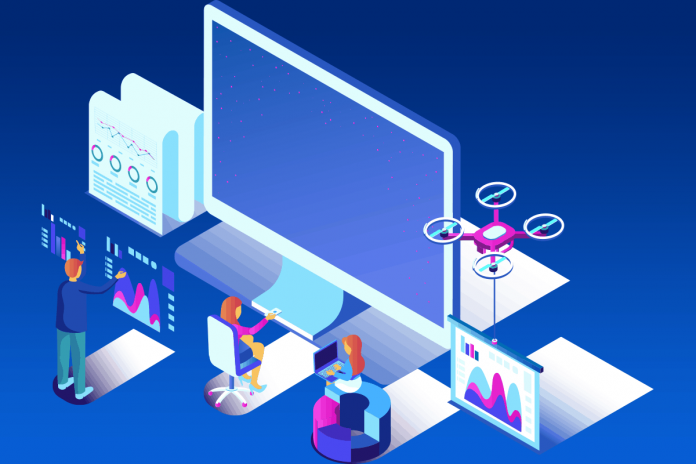This article is written by Ayushi Mahajan, from the Centre For Legal Studies, Gitarattan International Business School (Guru Gobind Singh Indraprastha University). This article talks about the issues related to covid-19 and its impact on the advocate’s office and its related concepts.
Table of Contents
Introduction
2020 has been a revolutionary year both for the whole of the world and for the legal fraternity, as none of them has been left untouched by the epidemic. Even when the epidemic was looming over us initially and the lockdown was announced, lawyers and their other partners were very much concerned about their cancelled overseas holidays and other plans for the summer vacation.
The lockdown due to COVID-19 has brought all the human activity to a terrifying halt. The legal sector has also been highly affected. Once the lockdown was lifted, everyone remained apprehensive about being in office. In such a scenario, office digitization has gained traction. While law firms have sufficient resources for the transaction of the professionals to perform the task, stand-alone law offices are concerned with this situation.
COVID-19 and its impact on legal business
Since practising law and being barristers is one of the major functions and business of every country’s lawyers is for justice to prevail so that justice would prevail, and for their country to set a benchmark in providing relief to the citizens by giving appropriate judgments. But the crises that emerged during COVID-19 posed a huge challenge to hamper human rights and the rule of law. The pandemic affected lawyers all around the world in their daily professional activities which in turn caused a huge impact in the legal profession. Access to justice was limited due to the closure of the courts.
Many legal professionals were not allowed to open their chambers in many Indian states for more than two months. Many of the hearings were postponed due to several days. Family members of arrested persons were deprived of the assistance of lawyers. After many days, there came a provision of virtual hearing through video conferencing of most important matters and now it seems to be a very normal way through which courts can hear matters by following proper social distancing and avoiding gatherings.
However, the COVID-19 beast forced us to mould an entire age-old system into a virtual world. Traditional lawyers were left to the mercy of millennial juniors or associates who became their walking assistants as they learned the specifications of digital communication while the rest of the legal community extended itself towards the social media platforms. The system was changing, and imminent change came with many imminent challenges.
Legal fraternity
Every profession is trying its best to control the crisis, but there are only a few of them who are able to control it. Once this pandemic is over, everything from our lifestyle to our eating habits will change. Life will change, as we all know. In such circumstances, one can only use this epidemic to challenge oneself and use this opportunity to bring positive changes in society.
Since the laws govern this society, this epidemic has given the legal fraternity a chance to change and practice litigation. Using technology, things can be innovated in a way to increase legal knowledge as well as the legal knowledge around the country.
Use of artificial intelligence in the courts pre COVID crisis
In a recent celebration of Constitution Day, the Chief Justice of India SA Bobde had proposed to introduce a system of artificial intelligence (AI) to improve the country’s judicial system. Such an arrangement will help in better administration and decision making. However, the Chief Justice of India also mentioned that the people should not consider that digitization will ever change the judges of the country. The event was organized by the Supreme Court Bar Association (SCBA) in which the CJI stated that “if possible we propose to introduce a system of artificial intelligence. There are many things, which we have to see before we introduce ourselves. We do not want to give the impression that it is ever going to substitute judges.”
President of India Ram Nath Kovind was also present at the event where the Supreme Court App was introduced. Talking about the application, Justice Bodbe said that artificial intelligence law and order would improve the quality of translation and help improve the efficiency of the Indian judicial system. The application that was released will translate the judgments into nine religious languages.
A meeting of the e-committee of the High Court was held in which the head of the Supreme Court’s e-committee, Justice DY Chandrachud, emphasized the need to start the virtual courts in all the states, not just to deal with traffic in voice but also in all other summary violations.
Shift to the digitalization
The Supreme Court of India is leaving no stone unturned to hear and close the cases through the courts and there was a nationwide lockout till May 3. On 23 March, in order to practice social distancing and to prevent the spread of the coronavirus, the court decided to ban the entry of the lawyers and the litigants, and it was also decided that they would hear only those matters which were of the utmost importance and urgency.
According to recent reports, the Supreme Court heard a number of 593 cases in the last 34 days through video conferencing and some other digital facilities. Out of 593 cases, 203 were related cases, that is, the main case, as well as cases related to the same issue, were heard. Apart from this, the apex court also rendered judgments in 41 cases during this period.
In addition to court cases, online counselling has been initiated by lawyers for their clients. Lawyers are now advising their clients online through video calls or telephonic calls to find out what is legally right and legally wrong.
Lawyers are able to take up the cases and then study them so that no time is lost to fight such cases in the near future. This is the right time for litigants to make room for them and earn the trust of their customers. Such situations would later lead potential clients to lawsuits.
Large law firms are able to connect with their clients through social media apps and then work from home technologies for employees is working well for such firms. As most of the work of these firms is about research and writing, work from domestic structures is proving helpful to them.
Therefore, the legal fraternity has seen a significant change in the way Post-Covid-19 works, being productive as well as beneficial to them.
Future of legal fraternity
In an epidemic, where the government is asking businesses to provide full pay to their employees and not to fire them due to lockdown, consider the legitimacy and issues of the company that have to fire its 200 to 300 employees nationwide. The company should consult law firms and consider the advice of lawyers. In addition to all this, the company will require a lot of paperwork and documentation to legally fire its employees without mistakes and errors. On the other hand, fired and frustrated employees during this time should eagerly wait for the lockdown to end and seek advice from their legal friends to sue the company for such ignorant acts.
Consulting your lawyers and then filing the legal cases against them again means working for the legal fraternity. Therefore, the future seems to be full of opportunities for lawyers and law firms. All they have to do is target the right group of people and instil confidence in customers. For lawyers, the COVID-19 crisis is a boon under the cover of bane. When clients have a lot of problems, lawyers thrive. The crisis has caused a lot of problems for customers. And so a lot of work – now, and for the coming months, for lawyers.
Introduction to e-contracts
After Covid-19, digitization is taking place and hence e-contracts are also growing and making their place in the economy. Electronic contracts or e-contracts are recorded via electronic forms, mostly through software systems, as traditional contracts are documented on paper and signed using ink. Indian laws are recognizing various types of e-contracts such as contracts that are entered through emails, clickwaps and shrink wrap contracts, and other similar platforms. However, to recognize it as a valid and legally enforceable contract, the prerequisite of the Indian Contract Act, 1872 must be followed.
The execution of e-contracts is done in various ways, one of the easiest and safest ways is by digital signature. The Information Technology Act enables digital signatures to be obtained in a scenario where there should be social distance, and people are not allowed to meet each other.
Digital signatures are introduced so that contracts can be digitally signed and not disturbed by social distancing norms. It is important to note that there are certain contracts that are not eligible for execution through the online mode. Also, contracts that are executed should be done only after seeking the help of legal people. The government is also taking the initiative to open an online portal for payment of stamp duty for such contracts.
A five-point guide to digitizing an advocate’s office
Some important points to keep in mind while digitizing an advocate’s office are as follows:
Implement CPBH
Reading a PDF file for a time reference is different from working continuously on PDF case files on a daily basis. There are many functional differences between a physical file and a raw scanned PDF of a single file (for example, differences in running pagination).
Long-term differences can only be achieved by eliminating these differences. These differences can be eliminated by scanning the CPBH (which stands for cleaning, page-labelling, bookmarking, and hyperlinking).
Procure a scanner
Gone are the days when the scanner was considered a luxury item in a lawyer’s office; Scanners are now a requirement. No serious digitization can be achieved without a decent scanner in your office. When purchasing a scanner, note the following features:
- It should have an automatic document feeder (ADF).
- The scanner must have a reasonable scanning speed (minimum 20 to 25 pages per minute).
- It should be capable of two-side scanning.
- The scanner should be designed for daily heavy use.
Invest in a good PDF editing software
PDF will become the new normal in the office routine. Word migration (such as Microsoft Word) was required during the migration from computer to typewriter, a good PDF editing software is mandatory to run a digital office. A good PDF editing software enables you to perform many tasks on all aspects related to PDF, including mandatory CPBH.
Subscribe to a cloud storage
Similar to the storage area for your physical files, you need common digital storage for your electronic files, accessible to everyone in your office (as opposed to personal storage on your computer).
The easiest option is to subscribe to consumer cloud storage. The most commonly used cloud storage platforms are Dropbox, OneDrive and GoogleDrive. In my opinion, Dropbox offers an intuitive experience in heavy use compared to OneDrive and GoogleDrive.
Invest in a good tablet with a stylus
To completely replace pen and paper, consider investing in a good tablet and stylus, a complete writing experience. They provide the benefit of mobility, allowing you to work from any location with the same experience as your office desk
There are many tablets in the market. The most commonly used are the Apple iPad Pro (with Apple Pencil) and Microsoft Surface (with its pen). There are also several Android options. Each device has its advantages and disadvantages. Please choose a tablet that suits your subjective needs.
Conclusion
The Covid-19 is a troublesome situation for everyone, but this is a testing time. The legal mind must now be creative and find opportunities and solutions in this chaos. As soon as the lockdown is up, things will change and the only option left will be to adopt such a change. Large law firms, as well as individual lawyers and small law firms, have been stellar about the Covid crisis, innovating new services, helping clients with their current legal problems, and some from Covid dedicated desks have also been established for related works. Therefore, one who will be well prepared will be able to find the right opportunities during and after Covid-19.
References
- https://www.soolegal.com/roar/post-covid-19-digital-shift-of-legal-practice
- https://www.advocatekhoj.com/library/bareacts/indiancontract/index.php?Title=Indian+Contract+Act,+1872
- https://www.barandbench.com/columns/5-point-guide-to-digitise-an-advocates-office
Students of Lawsikho courses regularly produce writing assignments and work on practical exercises as a part of their coursework and develop themselves in real-life practical skill.
LawSikho has created a telegram group for exchanging legal knowledge, referrals and various opportunities. You can click on this link and join:
 Serato DJ Crack 2025Serato DJ PRO Crack
Serato DJ Crack 2025Serato DJ PRO Crack











 Allow notifications
Allow notifications


